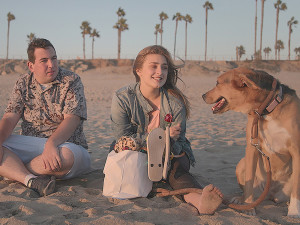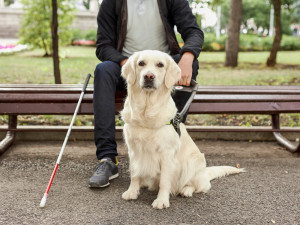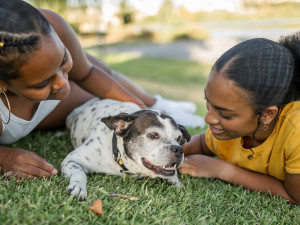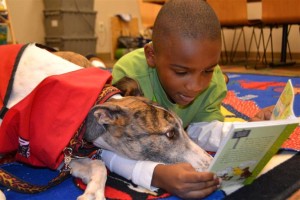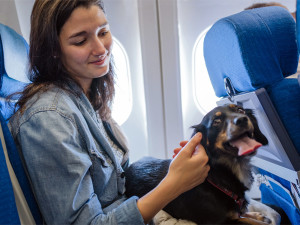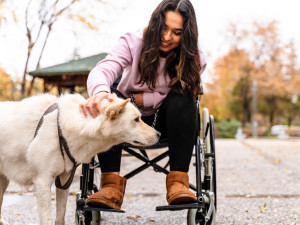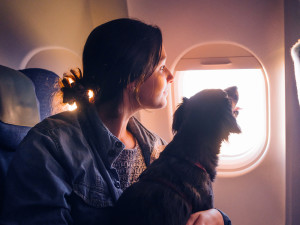Dogs Improve the Sleep Habits of Children With Autism, New Study Finds
New research shows that service dogs help autistic kids sleep better and longer.
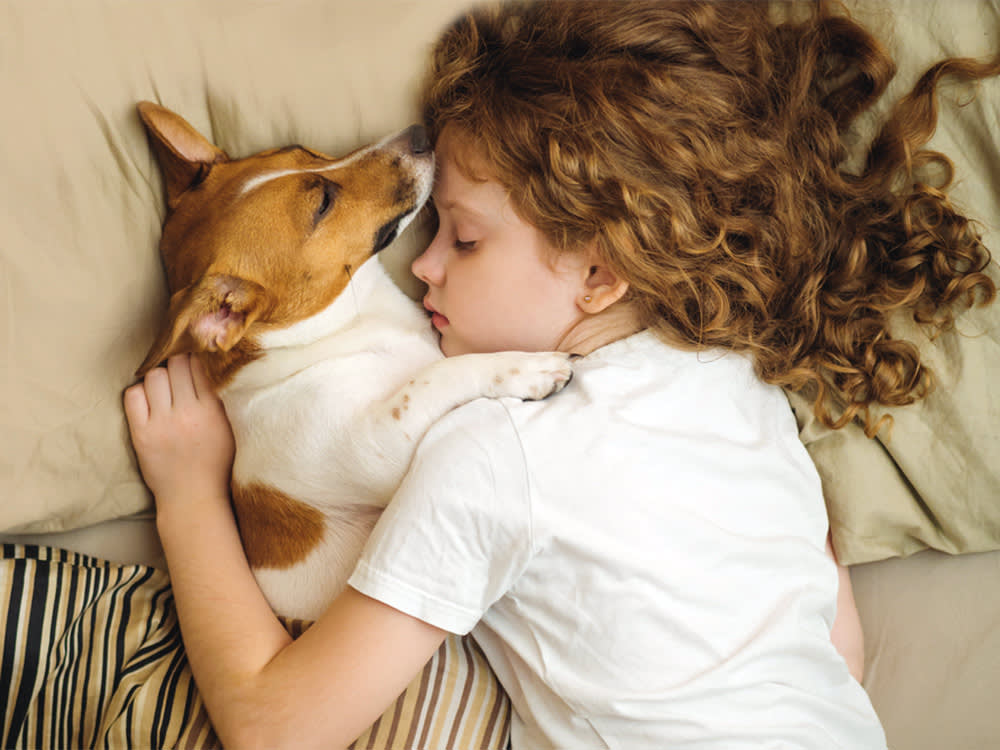
share article

Your pet wants you to read our newsletter. (Then give them a treat.)
Most dog parents can attest to the joy of having a pup curled up close by during bedtime — it’s like going to a spa, but better. Having an adorable dog by your side might feel as calming as taking a melatonin supplement, but research showsopens in a new tab that most people sleep a tiny bit worse with a dog in the bed. They’re precious, but they’re probably kicking you awake during their squirrel-chasing dreams, too.
But that’s not true for everyone. Researchers recently found that for autistic children, living with a service dog can have serious positive effects on their own sleep habits. According to a new studyopens in a new tab published in Frontiers in Psychiatry, service dogs significantly improve the sleep quality of children with autism.
The study’s findings
Dogs can be trained to help people with autism with a variety of thingsopens in a new tab, including providing calming pressure and preventing sensory overload. The use of dogs for services related to autism has increased in recent years — according to Assistance Dog International, there are currently 73 accredited organizationsopens in a new tab that will help pair people with autism with service dogs. In the study, researchers aimed to find answers about how effective service dogs are for improving the lives of autistic children.
The study recruited 75 families of children with autism; 39 already had a service dog, and 36 were on a waitlist for a service dog. Researchers had the caregivers fill out a survey on their child’s habits and lifestyle, as well as their own.
Comparing the results, they found that “having a service dog was significantly associated with better child sleep behaviors, including better sleep initiation and duration and less sleep anxiety,” wrote Dr. Kerri Rodriguez , the lead author of the study. Though they were not able to determine exactly why the presence of a service dog made such a difference, they suggest that service dogs “provide a sense of security and comfort to a child with autism at night, which may translate into exhibiting less sleep anxiety and co-sleeping behavior with a caregiver.”
The study didn’t find a difference in sleep behaviors for the caregivers, but they note that this may be because the caregivers surveyed already reported few sleep disturbances — so they may not have been as sensitive to the dog’s presence as someone with difficulty sleeping. Other research has found that the caregivers of autistic children with service dogs have reported better sleep themselves, thanks to their kids’ improved habits. One participant in another studyopens in a new tab said: “The first night [the service dog] came home, [my child] slept through…I have my life back, I’ve got sleep.”
Other advantages of service dogs for autistic children
Though this study didn’t find any other impacts of service dogs on the health and habits of autistic children, other research supports the use of service dogs for a variety of benefits. One studyopens in a new tab found that horses and dogs can decrease stress and increase positive emotions; another foundopens in a new tab that service dogs decrease aggression. In interviewsopens in a new tab, caregivers have reported that dogs have interrupted or decreased tantrums, reduced feelings of isolation, and calmed autistic children.
Dr. Annie Bowes, a veterinarian who is on the autism spectrum, told The Wildest opens in a new tabin 2022 that dogs can improve the lives of autistic and non-autistic people by providing unconditional love and acceptance. “Fortunately, acceptance isn’t something that comes with a high price tag,” she said. “In fact, it can often come with four legs and a wagging tail. Further, I can say unconditionally that anyone with a dog in their home will see each member of the family bloom with their presence, whether there is a person with autism in that family or not.”

Sio Hornbuckle
Sio Hornbuckle is a writer living in New York City with their cat, Toni Collette.
Related articles
![Unrecognizable man sitting on a park bench with his service dog]() opens in a new tab
opens in a new tab10 Misconceptions About Service Dogs and Their Remarkable Partners
No, you can’t pet them when their human isn’t looking.
![Two Black women with curly hair laying on the grass with their senior dog laying between them]() opens in a new tab
opens in a new tabTherapy Dogs Can Help You With Your ADHD
Happy news: Pups can help support your (or your kid’s) everyday needs.
![]() opens in a new tab
opens in a new tab5 Places Where Therapy Dogs Do Their Best Work
At airports, hospitals, schools, and more, therapy dogs make things better.
![A woman sitting on a plane smiling at a dog on her lap.]() opens in a new tab
opens in a new tabWhat People Can and Can’t Ask You About Your Service Dog
The questions will come, so you should be prepared with answers.
![A brunette woman sitting in a wheelchair wearing a pink sweatshirt, black leggings, and brown Ugg boots petting an all white Shepherd mixed breed dog on a leash at the park outside]() opens in a new tab
opens in a new tabHow to Register Your Dog as a Service Dog
The short answer: No animal registration is required, but service dogs still need to be properly trained.
![Backlit photo of a woman seated on an airplane holding her dog in her lap while they both look out of the open window.]() opens in a new tab
opens in a new tabYou Can’t Fly With Your Your ESA, But Your PSD Is Welcome on a Plane
Find out how here, including what the heck those acronyms mean.
